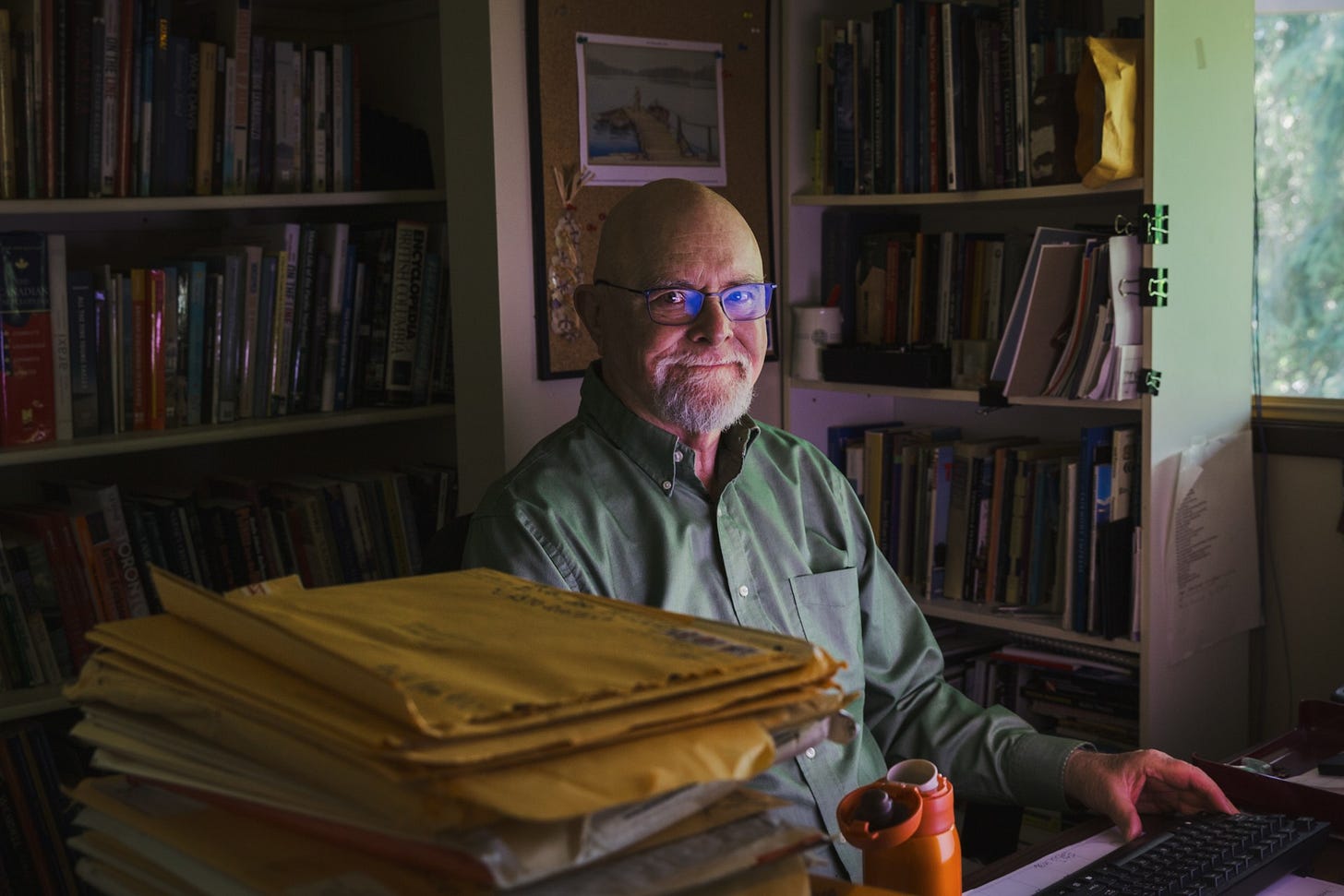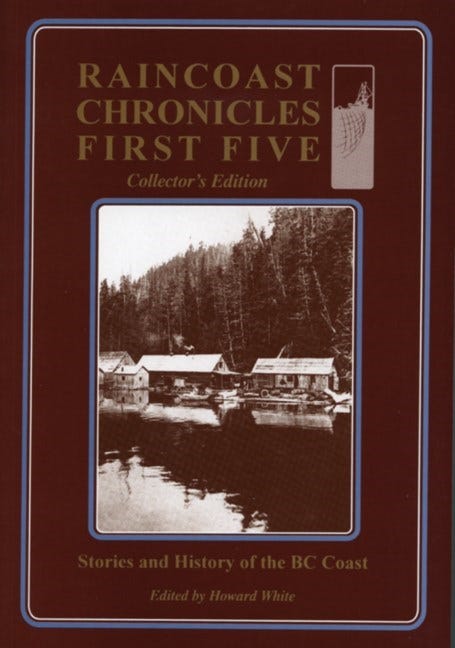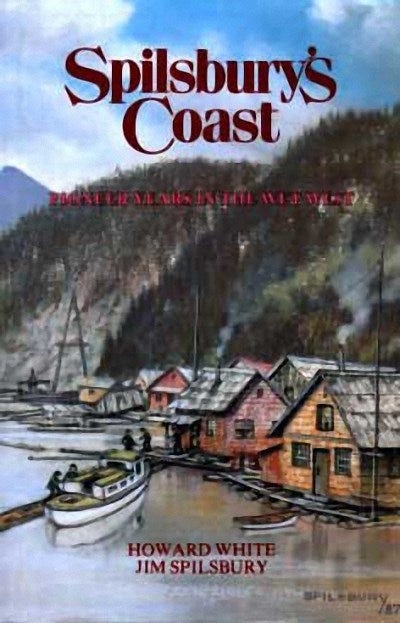Howard White reveals a hidden fact about BC literature
Harbour's publisher and founder speculates why British Columbians are such dedicated readers
Recently, Harbour Publishing’s Howard White visited the Courtenay and District Museum to speak about Raincoast Chronicles Fifth Five. At 712 pages, the tome is the fifth collection of Harbour Publishing’s precipitating publication, Raincoast Chronicles.
During the event, he mentioned something that stuck with me—that BC has an above average number of readers who devour BC content.
Consider this post a piece of community building, a confirmation of what you may have already suspected—that our literary heritage is significant, substantial, and very much alive.
Like me, you might be wondering: what explains this phenomenon? Why are we this way?
To find an answer, I spoke to Howard White by phone after the event. Below is a lightly edited version of our conversation.
Dave Flawse: Can you expand on your comments about BC’s interest in local literature?
Howard White: Yeah, I haven’t checked the figures lately. Over the years, various studies have shown that book purchasing per capita and library use per capita is higher in BC than in the rest of the English-speaking provinces.
I’m not sure if it’s more than in Quebec, which has also a very robust literary culture. And also, our library use figures and book purchasing figures are among the highest in the world.
So, I’m sure that’s still true, although I worry that book use is falling, just in the last several years. But I haven’t seen any figures to support that yet, but it’s just my own personal observation that people entranced and hypnotized by their cell phones and the mini videos that that hold their attention.
It’s not that they’ve quit liking books. It’s just that they don’t have much time left over for reading. Phones are eating into leisure time so dramatically that it just doesn’t leave much time for anything else.
I wrote a column in the local newspaper couple weeks ago where I quoted some figures showing that the average person on will spend something like 8 to 12 years of an average lifetime engaged with their cellphone.
It’s astounding. And it’s very recent. It’s just taken off exponentially in the last about five years. My own observation is that it has taken off exponentially in the last maybe two to three years here in BC.
That’s bound to affect every other kind of leisure activity, including book reading.
Book buying and use is still surprisingly healthy among all the print media. Book sales in Canada haven’t continued to increase at the same level they used to do it in the 70s and 80s, but they haven’t fallen off a cliff like magazine reading and newspaper reading.
So that’s the good news—they’ve maintained. I think in the past year they declined slightly but very minimally. So yeah, books are hanging in there.
DF: Why do you think BC residents are such dedicated readers?
HW: I don’t know; I just know they are. I’ve never really been able to put my finger on a single reason.
I think it’s partly the historical makeup of the province. It did tend to attract people with imagination who wanted to explore and push further west. And I think that still applies to immigrants who come here now.
They’ve passed on the chance to settle down and have a very conventional life in Montreal or Toronto and kept pushing towards the edge of the continent just like our ancestors did. Coastal people in general are more imaginative and tend to be more politically adventurous than inland people.
It’s just a sociological fact, and if you’ve got a coastal province that’s also somewhat to the north, I think that that pattern is accentuated a bit. That could be one very high-level reason that’s applied over the years.
There is such a thing as cultural momentum. When you get a group of people that is fascinated by its own history and it’s producing a lot of you know, books and films, and broadcasts dramatizing its own history then that tends to create more interest.
When we first started publishing BC stories and books. It was like a damn burst. It was like people had been just waiting for this to happen, and when we put out the first issue of Raincoast Chronicles in 1972, it sold 3000 copies, so we have to run to 10,000 copies.
It still kept selling, so we put it in a hardcover collection and that sold something like 100,000 copies. It was an eye opener, certainly to us, but also to other publishers who sort of said, “okay, there’s a market there.”
A lot of other writers and publishers started producing BC books, primarily nonfiction but also some fiction. And it created the largest regional market in English.
Ontario has a larger book market overall but not for regional writing. I’ve done a number of regional history books in Ontario, thinking, Well, they’ve got a much longer history and so many more people, but they didn’t sell more books. They actually sold fewer than a typical nonfiction history book in BC.
DF: What do you think would have happened if you hadn’t started Harbour Publishing or the Rain Coast Chronicles and bring this aspect of BC literature to life.
HW: Well, I think it would have been a different publishing history. When I started [Harbour Publishing], Grey’s Publishing was already winding down and had been publishing on a much smaller scale, some of the same kind of stuff that that we ended up doing.
They published the second edition of Curve of Time and they published George Clutesi, sort of pioneering the Indigenous lit stream, actually a very original and admirable publishing venture.
But Greg Campbell started it late in life, and he’d already retired twice from a military career and a ranching career, so he wasn’t able to keep it on, and he passed it on to Gordon Cooper, who wasn’t cut out to be a publisher, and it quickly ended.
And really, there wasn’t much else going on in that direction. Douglas and McIntyre, or JJ Douglas as it was then, did start doing Vancouver guidebooks, but both Jim Douglas and Scott McIntyre had come from branch plant publishing in Ontario.
Jim had actually trained in Scotland. So, they didn’t have the same regional vision that we did, and their list quickly started moving toward the national perspective.
I definitely think that that Harbour with things like Spilsbury’s Coast and Keepers of the Light, which were massive bestsellers, and all the Ann Cameron books, which showed that you could write good fiction about BC, strictly BC subjects, showed there was a way to write about BC in a way that spoke to BC people very intimately, and that there was a market for that.
Other people like Orca started basically following Harbour’s lead. Much later turned toward children’s literature. In the beginning they were basically doing books like we were. And quite a few other presses today, like Caitlin Press, publishes books a lot like Harbour’s.
I definitely think we proved that there was a market out there. We discovered this really strong regional market and that put ideas in the hand of other publishers as well as other writers.
DF: Thanks, Howard!






As a B.C. writer from a small coastal village who was deeply influenced by the first edition of Raincoast Chronicles I remain deeply grateful to Howard for his work at Harbour Publishing bringing our stories to life.